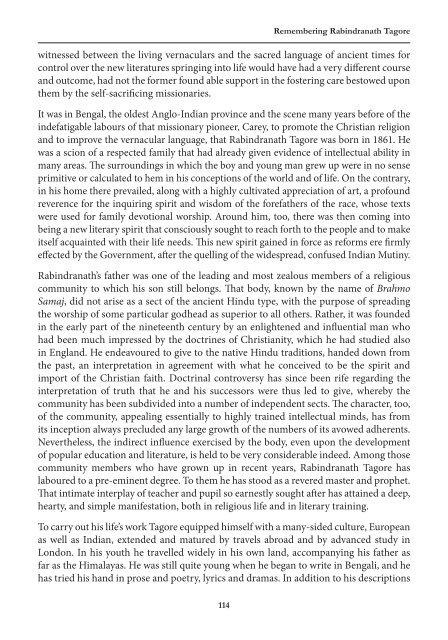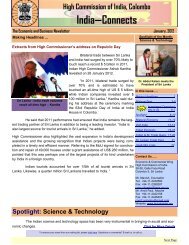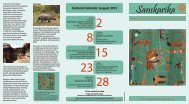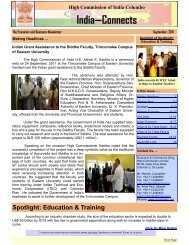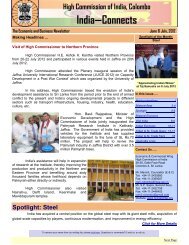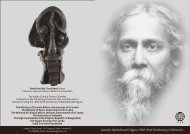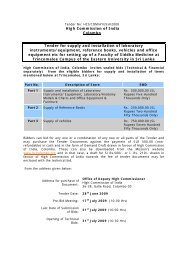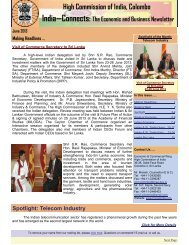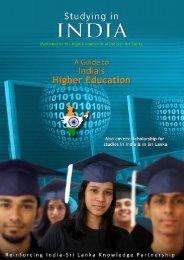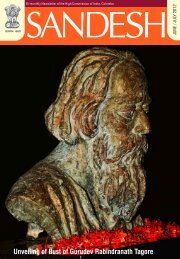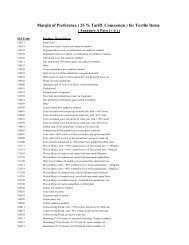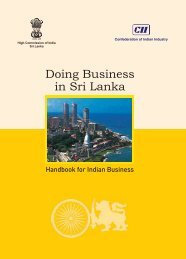Remembering Rabindranath Tagore Volume - High Commission of ...
Remembering Rabindranath Tagore Volume - High Commission of ...
Remembering Rabindranath Tagore Volume - High Commission of ...
Create successful ePaper yourself
Turn your PDF publications into a flip-book with our unique Google optimized e-Paper software.
114<br />
<strong>Remembering</strong> <strong>Rabindranath</strong> <strong>Tagore</strong><br />
witnessed between the living vernaculars and the sacred language <strong>of</strong> ancient times for<br />
control over the new literatures springing into life would have had a very different course<br />
and outcome, had not the former found able support in the fostering care bestowed upon<br />
them by the self-sacrificing missionaries.<br />
It was in Bengal, the oldest Anglo-Indian province and the scene many years before <strong>of</strong> the<br />
indefatigable labours <strong>of</strong> that missionary pioneer, Carey, to promote the Christian religion<br />
and to improve the vernacular language, that <strong>Rabindranath</strong> <strong>Tagore</strong> was born in 1861. He<br />
was a scion <strong>of</strong> a respected family that had already given evidence <strong>of</strong> intellectual ability in<br />
many areas. The surroundings in which the boy and young man grew up were in no sense<br />
primitive or calculated to hem in his conceptions <strong>of</strong> the world and <strong>of</strong> life. On the contrary,<br />
in his home there prevailed, along with a highly cultivated appreciation <strong>of</strong> art, a pr<strong>of</strong>ound<br />
reverence for the inquiring spirit and wisdom <strong>of</strong> the forefathers <strong>of</strong> the race, whose texts<br />
were used for family devotional worship. Around him, too, there was then coming into<br />
being a new literary spirit that consciously sought to reach forth to the people and to make<br />
itself acquainted with their life needs. This new spirit gained in force as reforms ere firmly<br />
effected by the Government, after the quelling <strong>of</strong> the widespread, confused Indian Mutiny.<br />
<strong>Rabindranath</strong>’s father was one <strong>of</strong> the leading and most zealous members <strong>of</strong> a religious<br />
community to which his son still belongs. That body, known by the name <strong>of</strong> Brahmo<br />
Samaj, did not arise as a sect <strong>of</strong> the ancient Hindu type, with the purpose <strong>of</strong> spreading<br />
the worship <strong>of</strong> some particular godhead as superior to all others. Rather, it was founded<br />
in the early part <strong>of</strong> the nineteenth century by an enlightened and influential man who<br />
had been much impressed by the doctrines <strong>of</strong> Christianity, which he had studied also<br />
in England. He endeavoured to give to the native Hindu traditions, handed down from<br />
the past, an interpretation in agreement with what he conceived to be the spirit and<br />
import <strong>of</strong> the Christian faith. Doctrinal controversy has since been rife regarding the<br />
interpretation <strong>of</strong> truth that he and his successors were thus led to give, whereby the<br />
community has been subdivided into a number <strong>of</strong> independent sects. The character, too,<br />
<strong>of</strong> the community, appealing essentially to highly trained intellectual minds, has from<br />
its inception always precluded any large growth <strong>of</strong> the numbers <strong>of</strong> its avowed adherents.<br />
Nevertheless, the indirect influence exercised by the body, even upon the development<br />
<strong>of</strong> popular education and literature, is held to be very considerable indeed. Among those<br />
community members who have grown up in recent years, <strong>Rabindranath</strong> <strong>Tagore</strong> has<br />
laboured to a pre-eminent degree. To them he has stood as a revered master and prophet.<br />
That intimate interplay <strong>of</strong> teacher and pupil so earnestly sought after has attained a deep,<br />
hearty, and simple manifestation, both in religious life and in literary training.<br />
To carry out his life’s work <strong>Tagore</strong> equipped himself with a many-sided culture, European<br />
as well as Indian, extended and matured by travels abroad and by advanced study in<br />
London. In his youth he travelled widely in his own land, accompanying his father as<br />
far as the Himalayas. He was still quite young when he began to write in Bengali, and he<br />
has tried his hand in prose and poetry, lyrics and dramas. In addition to his descriptions


